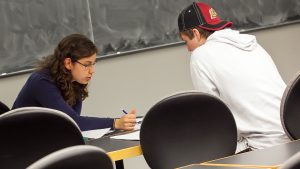Why SI?

The Academic Tutoring and Training Information Center (ATTIC) provides academic services to enhance student success.
He heard that the ATTIC provided a helpful tutor for the girl that sits next to him in math and so in a moment of confused exasperation, your student fills out the online tutor request form [https://attic.lafayette.edu/tutoring-and-supplemental-instruction/tutor-request-form/]. Almost immediately, he hears the familiar tone that indicates he has received a new email. It is an auto-reply from the ATTIC letting him know that his request has been received, will be reviewed, and directing him to the schedule of SI sessions in the meantime.
Why SI? What is SI anyway? SI stands for Supplemental Instruction which was created at the University of Missouri-Kansas City in 1973. According to the International Center for Supplemental Instruction website, SI is an academic assistance program that utilizes peer-assisted study sessions which are regularly scheduled, informal review sessions in which students compare notes, discuss readings, develop organizational tools, and predict test items. Through SI, students learn how to integrate course content and study skills while working together. The sessions are facilitated by “SI leaders”, students who have previously done well in the course and who again attend all class lectures, take notes, and act as model students.
The key benefit that an SI offers over individual tutoring is the SI Leader’s connection to the course and course professor. This allows the SI Leader to do more than simply explain course materials and concepts. SI Leaders strive to integrate what to learn with how to learn. This approach draws on well established research on learning to facilitate metacognition. Metacognition is a fancy term to describe the relatively simple action of increasing students’ awareness of their thought processes through reflection. A student’s ability to engage in metacognition is considered an essential key to efficient higher-order learning and one of the key reasons that this type of support is offered in many first and second year S.T.E.M. and gateway courses.
There are two types of SI meetings, Supplemental Instruction Sessions and Drop-in Sessions. Each format is generally scheduled two times per week throughout the semester. Students can expect structured discussions and activities during SI Sessions, and one on one or small group question/answer sessions during Drop-in Sessions. It is a proactive approach that students should visit frequently. In fact, data indicates that students at Lafayette who attend SI regularly tend to achieve, on average, one letter grade higher in the course than those who use no support or tutoring alone. The full schedule of SI sessions and other support options available across campus can be found on the ATTIC website [https://attic.lafayette.edu/tutoring-and-supplemental-instruction/].
Christopher Selena
Assistant Dean of Advising & Co-Curricular
Programs, Director of the ATTIC
selenac@lafayette.edu
610-330-5080